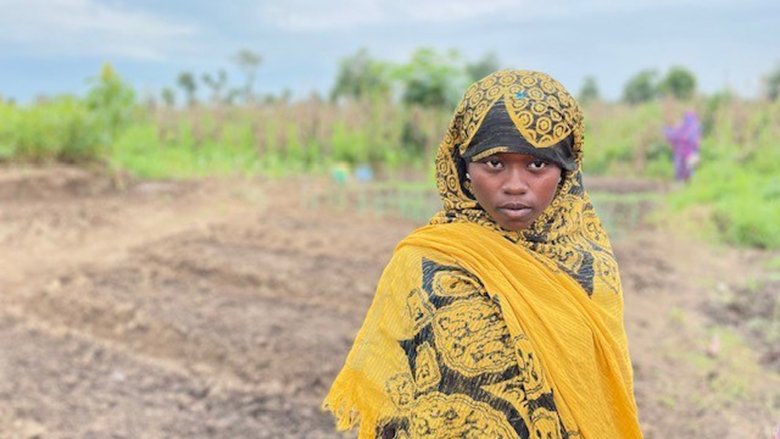After watching a warring group burn her entire village down, Atong (not her real name) a 19-year-old mother of one, fled with her family to a refugee settlement in Jamjang, South Sudan. Atong lives with her family alongside 123,000 other Sudanese refugees in a makeshift shelter provided by the United Nations High Commissioner for Refugees (UNHCR). Although, the refugees in Jamjang outnumber the 100,000 people in the host community, they have generously hosted them for nearly a decade. While access to water and food is a challenge, Atong feels more secure here than back home in Sudan.
Hosting refugees amid development challenges
The fact that South Sudan is host to some 330,000 refugees is often drowned by the headlines on civil strife and humanitarian crisis facing the country. South Sudan is one of the world’s poorest countries, plagued with fragility, conflict, and violence (FCV). Nearly eight out of 10 people live in poverty and an estimated 60 percent of South Sudanese face severe acute food insecurity or worse. The country is a classic case of `compounding’ crisis - dealing with the devasting effects of COVID-19, desert locust invasion, and flooding. These have increased food insecurity and further exacerbated malnutrition for millions of people.
Despite South Sudan’s myriad challenges, the Jamjang settlement is but one of the nine refugee settlements that South Sudan hosts, most of them in the far north of the country in Upper Nile State and the Ruweng Administrative Area. Nearly all –of the refugees in South Sudan are Sudanese (95 percent)- with the rest having come from the Central African Republic, Democratic Republic of Congo (DRC), and Ethiopia. South Sudan has also hosted asylum-seekers from Eritrea and Burundi.
Transitioning to development approach
To meet the challenges of hosting refugees amid its own severe humanitarian and development needs, the Government of South Sudan (GoSS) has engaged closely with partners, especially the UNHCR, to provide protection and deliver basic services to refugees and host communities. However, the Government has more recently sought to transition from emergency humanitarian assistance to a more sustainable, development-focused approach to refugee issues, as reflected in its Durable Solutions Strategy for Refugees, Internally Displaced Persons, Returnees and Host Communities. The strategy, which encompasses the Government’s policy on all forms of forced displacement, was recently adopted as part of the Intergovernmental Authority on Development- an eight-country regional cooperation bloc- Solutions Initiative for Sudan and South Sudan.
To help transition to that more sustainable approach, the Government has sought to engage closely with the World Bank. In December 2021, South Sudan became eligible to access resources from the International Development Association (IDA) Window for Host Communities and Refugees (WHR). WHR is a special financing window that supports countries hosting significant refugee populations to address socioeconomic vulnerabilities and create medium- to long-term development opportunities for both refugees and host communities. Through WHR, the World Bank, for the first time will be able to support programs specifically focusing on refugees and host communities in South Sudan. The World Bank’s Board of Directors has approved $70 million in WHR financing as part of the Enhancing Community Resilience and Local Governance Project-II and COVID-19 Emergency Response and Health Systems Preparedness Project. Both projects will help deliver critical services such as access to basic health care, COVID-19 vaccines, clean water, and education to refugees and their host communities.
“While WHR support will not be a panacea, it will help the GoSS build on and consolidate the crucial gains of humanitarian aid and transition to a more durable, development-oriented approach to improving the socioeconomic conditions of refugees and host communities,” says Firas Raad, The World Bank Country Manager for South Sudan. “Thanks to Government commitment and the incredible work of UNHCR and other partners, there is already strong solidarity and peaceful coexistence between refugees and hosts in South Sudan. WHR will further reinforce this by supporting both communities to improve their lives and work towards a better future,” adds Raad.
Supporting Government to lead the transition aligns with a key priority of the latest World Bank Country Engagement Note (CEN) for South Sudan to strengthen the capacity of public institutions for service delivery and other core aspects of governance. The CEN places strong focus on leveraging IDA funds and the World Bank institutional strategy for fragility, conflict, and violence (FCV) to address some of the most pervasive and persistent challenges facing the country.
Progressive policies for refugees
Atong’s family is among the refugees who have built their lives in refugee settlements in South Sudanese communities. Atong considers herself lucky to be alive but also feels valued because she earns an income to take care of her family. To other refugees, tracts of land have been generously allocated for farming, an example of South Sudan’s relatively progressive framework for hosting refugees.
"South Sudanese through their empathy and experience are very good toward refugees,” notes Arafat Jamal, UNHCR Representative to South Sudan. “Most of the government officials have experienced some form of exile. They know what it’s like to be uprooted and they know what it’s like to be at the mercy of another country while surviving by the whims of different international organizations. So, their policy on paper and in practice is exemplary,” explains Jamal.
Indeed, Atong enjoys the right to work, to obtain public services and to move freely thanks to South Sudan’s progressive approach to hosting refugees. South Sudan has signed on to the relevant regional and international refugee conventions and protocols, including the Global Compact on Refugees. South Sudan has also taken concrete steps to make it possible for refugees to enjoy their rights, including enacting a Refugee Act in 2012 and establishing a Commission for Refugee Affairs to manage issues related to refugees. Even as the country continues to face immense humanitarian challenges and elevated levels of violence, South Sudan shows that commitment to an inclusive approach can yield gains for both refugees and the communities that generously host them.

